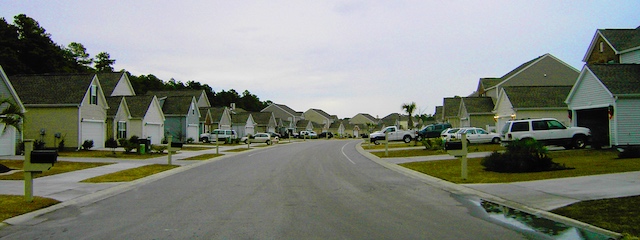“Wall Street is snapping up [single-] family homes,” reports the Economist. This isn’t exactly news. A year ago, CNN reported the same thing. Two years ago, the New York Times reported a “$60 billion housing grab by Wall Street.” Three years ago, the Atlantic announced that “Wall Street is your landlord.”
Wall Street’s or your street? Photo by isipeoria.
These articles are often accompanied by an implicit accusation that Wall Street speculators are responsible for housing becoming unaffordable. Sometimes the accusation is more explicit. A year ago, Tucker Carlson claimed that the “phenomenon of skyrocketing house prices is being driven by Wall Street outbidding normal Americans trying to buy homes.” Earlier this week, HousingWire.com claimed that “Institutional purchases are . . . making houses less affordable.”
If this were true, then the number of owned single-family homes would be shrinking while the number of rented single-family homes would be growing. But that’s not happening.
According to table B25032 of the American Community Survey, there were 4.5 million more owner-occupied single-family homes in 2021 than in 2019. Meanwhile, the number of rented single-family homes fell by 170,000. If Wall Street investors are attempting to corner the market on single-family homes, they are doing a lousy job of it.
Of course, they aren’t trying to corner the market on homes. Instead, they are merely taking advantage of home prices that are rising for completely different reasons.
In general, prices have been rising because supply-chain problems and labor shortages have made it difficult for homebuilders to ramp up to meet the increased demand for low-density housing that was stimulated by the pandemic and telecommuting. In some parts of the country, prices were rising before the pandemic due to land-use laws limiting the construction of more single-family homes.
The Economist warns that buying homes as an investment “comes with risks.” That’s especially true in states such as Arizona, North Carolina, and Texas where there are few land-use laws inhibiting more construction. However, in places with strong land-use regulations, such as California, Hawaii, Oregon, and Washington, prices will continue to rise even after homebuilders are meeting demand elsewhere.
So speculators shouldn’t be blamed for increased prices any more than should the blame be put on AirBNB or single-family zoning. Homebuilders may need to develop (or rediscover) new methods of home construction that are less labor intensive, but in the long run, housing will remain affordable wherever government doesn’t try to restrict single-family homes for inane reasons.









the federal government who created the laws and the loopholes but also because they made banks and lending institution lend to unqualified people including people of color at the behest of public advocates who argued banks were racist. Like Maxine Waters that forced the banks to start making subprime loans through the CRA.
That’s why the big banks will never be prosecuted despite what political candidates promise…their ultimate prosecutorial defense would be to point out what govt either made them do or said was “Legal”
So politicians demonized banks, bailed them out. Better to be a wealthy pariah then a poor respected person
Cheap easy money often leads to piss pour investments.
Give it a little time; this thing of Wall Street buying $250K houses for $350K assuming they can rent them out + sell them for more down the road won’t last.
Just like Uber Eats + Door Dash.